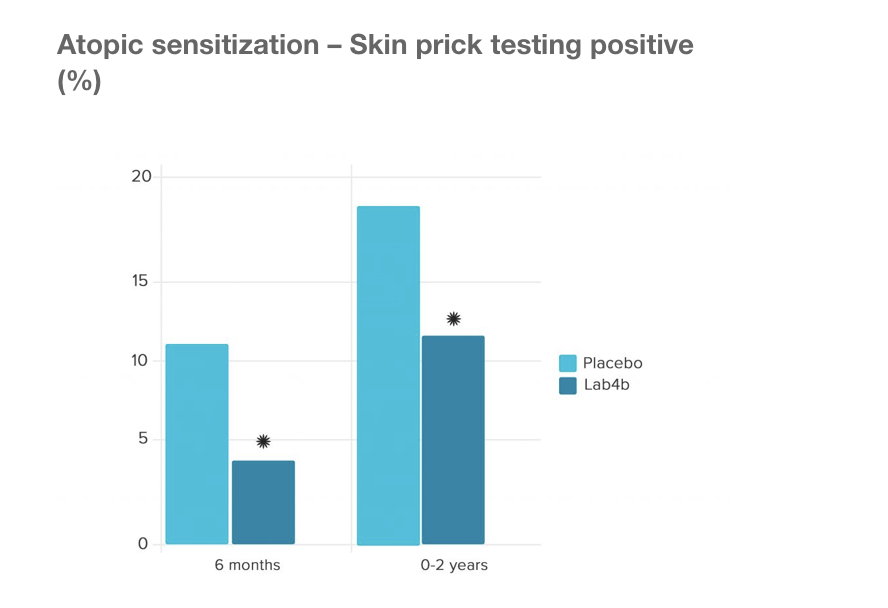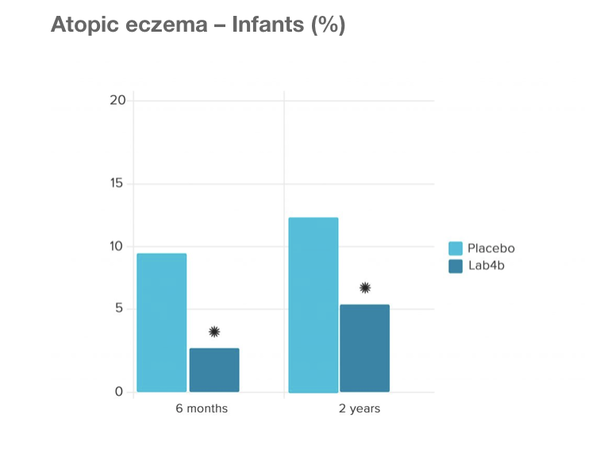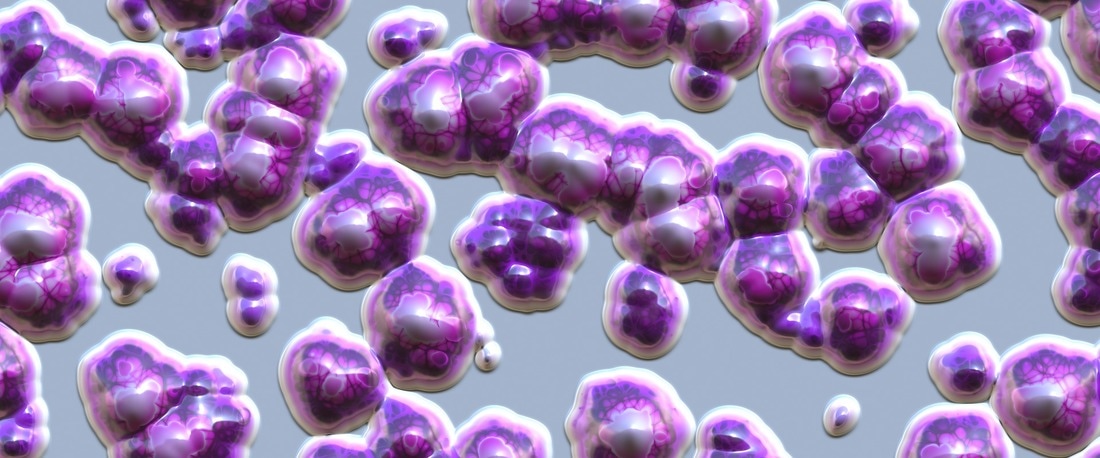|
Most women will experience some form of vaginal issues within their lifetime such as thrush, BV or AV. But what are the differences and what are the risk factors for these conditions?
0 Comments
"Don't you just love New York in the fall, it makes me wanna buy school supplies" You've got mail.
Starting the new school year can be an exciting time. Buying new stationary, new uniforms and going into a new class with a new teacher can make it an unsettling but exciting time of change for children. But, as every mum and teacher knows, those first few weeks back always bring an explosion of bugs, and children who are immune compromised can become easy prey for some of these viral attacks. Making some diet and lifestyle changes can help boost your child's immunity and make a real difference to their overall health and wellbeing. Here are our top tips for a healthy school year. For more information in some of the common childhood ailments such as eczema have a look at our comprehensive blog here. Following the steps recommended below will support children suffering from a range of immune system challenges including asthma. More information on nutritional therapy for children found here Optimise Vitamin D Vitamin D is an essential vitamin which is essential for maintaining healthy levels of calcium in the blood. Vitamin D also plays an essential role in immune system health and cell growth. The main source of Vitamin D is from exposure to natural sunlight from the sun. However, from October to March the rays of the sun in the UK are not strong enough to enable our bodies to make Vitamin D. As a result, it is now a government recommendation that everyone should supplement with Vitamin D from October to March each year. Recommended dosages for children vary according to body weight. Look after Gut Health It is estimated that between 70%-80% of our immune system is located in our gut which means that what we feed our gut bacteria can impact our immune health. Prebiotics such as garlic, leeks and asparagus feed the friendly bacteria in our guts so consuming these on a regular basis can benefit gut health. Probiotics have also been shown in clinical trials to have a beneficial impact on gut and immune health. Optibac and Proven both have good ranges for children. ProVen Fit for School was used in the ProChild study, which took place over six months and those children taking Fit for School saw a 30% reduction in absenteeism from school due to coughs, colds and other upper respiratory tract infections (URTIs). The study also found that the duration of coughs and colds was halved in the children taking Fit for School and visits to the doctor and consequently prescription for antibiotics was reduced by 43%. This probiotic is suitable for children aged 4-16. Consume Omega 3 Omega 3 is great for our brains and helping us focus. Omega 3's also reduce inflammation and prevent attacks by toxins or pathogens. Food sources include oily fish, eggs, walnuts, flax, chia seeds and grass fed meat. If you're concerned that your child won't eat many of the foods which contain Omega 3, you could supplement with a good source of omega 3 such as Eskimo 3 Bright Kids Jelly Splats. Eat a Rainbow Eating a wide variety of colourful fruits and vegetables ensures we get a combination of vitamins, minerals and antioxidants to support the immune system. If you're concerned about any nutritional gaps, BetterYou have designed a handy multi-vitamin spray for children with a blend of 14 essential nutrients. The robust multi-nutrient formulation contains the full spectrum of B vitamins, including folate, combined with vitamins A, C, D, K, selenium and iodine. Sleep Sleep is when our bodies rest and restore. It is therefore essential for optimal immune health. Aiming for at least 10 hours sleep for little ones is a great way to ensure they get the rest they need to grow and thrive. Avoid electronics and blue light effect from TV/ computer etc at night and ensure a good winding down routine of baths and stories. Relaxation music can be helpful for us all and some children benefit from white noise. Essential oils are ideal to diffuse in the bedroom and can aid sleep and relaxation. Talk to us about appropriate essential oils and other supports such as magnesium cream which can be helpful depending on age of the child. We hope you all have a happy and healthy school year! If you would like to know more about nutritional therapy for children, you can find more information on our children's nutritional therapy page or drop us an email to [email protected]. We also offer call backs too if you follow this link and one of the team will give you a call to discuss your needs. To order any of the above products mentioned just email [email protected] and we will send you a link to order the correct items. Eczema or atopic dermatitis is a chronic skin condition often causing red itchy inflamed skin which can range in severity from mild to severe. According to statistics around 15 million people in the UK live with this condition and in 2015 GP’s in England wrote around 27 million prescriptions for various topical agents costing around £169 million. If you are thinking to yourself that more and more people are suffering from this you’d be right in your assumption. An NHS funded study has shown that the numbers of cases have risen by 40 % in 4 years. What we do know about the condition is that it is an allergic condition with 80% of sufferers having raised IgE antibodies. Eczema patients have positive allergy tests and around two thirds have a family history. Many also suffer from other atopic conditions such as asthma and hay fever. The standard treatment protocols involve simply managing symptoms via emollients and sometimes steroids and if infection is triggered due to scratching, antibiotics. Allergens are also tested for although these tend to focus on only IgE mediated reactions. Other considerations…. Immune function We are back to finding our root cause. So first lets look at what’s going on in the immune system. The allergy antibody IgE is elevated in 80% of cases and this is activated by a type of white blood cell, a helper cell called TH2. Mast cells can release higher amounts of histamine leading to the itch that we associate with eczema. Then there’s the issue that around 90% of sufferers also have a predominance of the bacteria Staphylococcus aureus on the skin which their immune system is unable to kill. Often scratching can activate this infection and cause some potentially severe staph infections. So how do we prevent this vicious circle? Well we have to do everything we can from day one to promote our gut/immune function. In our immune system we have regularly T cells sometimes known as Treg, which are involved in immune suppression and immune tolerance. It’s known that an unhealthy gut can lead to a decrease in these important cells and therefore an imbalance in our TH1/TH2 cells with the TH2 cells being unregulated. Studies have indicated that the use of probiotics from birth can confer a reduction in TH2 dominance and symptoms of AD at 13 months old versus placebo. Breast feeding Studies have shown that breast feeding is associated with a reduced risk of eczema and other allergies. However there is a caveat here in that although breast milk may confer antibody protection, in at risk children it may also be necessary for the feeding mum herself to remove common allergens which may unwittingly be triggering the problem as these proteins pass through the milk. Common allergens being dairy, peanuts and eggs. That said, the advice is to introduce these common allergens while breast feeding at the 6 to 12 month stage and to then continue to breast feed for a further 6 months following this introduction. Older and formula fed children In older and formula fed children a study looking at triggers for eczema indicated that Peanuts eggs and milk have been shown to account for 80% of adverse reactions to foods in people living wth contact dermatitis. Other common triggers and are wheat, fish and soy. The hygiene hypothesis. Are we just too clean? Epidemiological studies, especially those looking at migration from one country to another indicate that we acquire the same immune disorders as soon as we move to another area so environmental factors are playing a huge role. Lifestyle changes have led to a decrease in infection in the industrialised world and this has been shown to be inversely correlated with increases in allergies and autoimmunity. Studies have also shown that exposure to animals or growing up on a farm confers protection from a young age as we are exposed to a greater variety of bacteria which leads to activation and modulation of innate and adaptive immune response. In one large Swiss study, nearly 14,000 children were surveyed between 2006 and 2007, with over 3,000 farming children and around 11,000 non-farming children. In this study, 38% of the non-farming children had allergies compared to 19% of the farming children. Digestive compromise Those living with allergies have commonly got some level of digestive compromise and dysfunction. Stomach acid which normally assists in the removal of infection and therefore has a protective role, can commonly become low and therefore play a role in weakening our immune system and make us more prone to infection. It also sets us up potentially for the leaky gut phenomenon which puts us at risk of further food sensitivities of the IgG variety (delayed reaction) and chronic inflammation. If you have intestinal permeability you may also be experiencing other health challenges e.g. fatigue, brain fog, headaches, depression, sinus, IBS, reflux, joint pain, and autoimmunity. This is also why I see many clients in clinic who may be coming along for help getting to the root of their eczema but who also have any number of the aforementioned symptoms. A lack of a very important nutrient zinc can ensue as a consequence of low stomach acid. This nutrient is essential for immune, gut, hormone and skin health. It affects appetite, smell and taste of food, so in children who have a narrowing of food choices and are no longer enjoying certain foods, zinc deficiency may be at the heart of this. It is also a particular problem in cases of acne in teenagers so look out for changes in eating and appetite in older children and test their zinc levels. This can be done with a very simple taste test which all the family can do. Adequate zinc is also required for healing the gut. Gut Flora and probiotics Because our immune system resides primarily in the gut we need to look at gut bacteria. We also need to weed out any trouble makers Interestingly yeast overgrowth is a common cause of eczema. It’s also a very common problem as the western diet of high sugar, refined carbs and low fibre sets up the perfect conditions for this to grow. In addition, yeast overgrowth can result from long term medication use e.g. antibiotics, steroids and the oral contraceptive pill. We therefore need to ‘weed and seed’ the gut, get the infections out and the good bacteria in to assist with immune balancing and symptom resolution. Risk factors for allergies in children This relates to those factors which influence the health of the micro biome from day one. In an ideal world we need to be focusing on the gut health of mum prior to a planned pregnancy as this is what baby inherits. Areas of concern are
The Swansea Study This was a large study by the University of Swansea Medical School with 454 mother/baby pairs who were given Lab4b probiotics containing Lactobacilli and Bifidobacteria both during the final month of pregnancy and the first 6 months of infancy to evaluate whether this would prevent allergy in children. The results showed that versus placebo, the probiotic groups did indeed confer a protective effect on prevention of eczema and also prevention of allergic reaction to common allergens including pollen, cows milk, eggs and dust mites. Prof. Steve Allen, concluded the following key message from the trial:‘Lactobacilli and Bifidobacteria administered to pregnant women and infants aged 0-6 months prevented atopic sensitization and atopic eczema. The babies given the Lab4b probiotics were 57% less likely to develop atopic eczema than those receiving the placebo. The babies given Lab4b were 44% less likely to develop allergic reaction to common allergens, including pollen, cow’s milk, egg and house dust mite. Stress
Stress is very much linked with gut/immune function and when we are stressed we are more likely to have a flare of these conditions so managing stress for young and old is a life long strategy for eczema management. Adaptogen herbs can be helpful as can mindfulness, meditation and essential oils such as lavender for relaxation. As those living with eczema have a tendency towards poor absorption due to gut compromise a common nutrient which we can find ourselves low in is magnesium and this is also because we actually use more of it when we are stressed. More tips here on how to maintain levels. Nutritional therapy/ Functional medicine approach for eczema The nutritional therapy approach involved recognition of all of the above factors and follows through with the following stages.
Further testing This can be done if required and in addition to either allergy or food intolerance testing we can offer stool testing to identify infection and imbalance and even cortisol testing if stress is a particular trigger. Supplements This really does depend on the individual. It depends on what else they may be presenting with, their individual root cause/s, what medications they are on etc. However core supplements to include are going to be probiotics to reinoculate the gut, omega 3 and vitamin D. We may also recommend supplements and diet change to support gut integrity and immune balancing as per above recommendations. More info on booking an appointment with us for adults and children here. Referenced Studies Burks AW, Williams LW, Mallory SB, et al. Peanut protein as a major cause of adverse food reaction in patients with atopic dermatitis. Allergy Proceedings 1989;10:265-269. Von Mutius E, Vercelli D. Farm living: effects on childhood asthma and allergy. Nat Rev Immunol. 2010;10:861–868. Allen SJ et al 2014. Probiotics in the prevention of eczema: a randomised controlled trial. Archives of Disease in Childhood 99(11): 1014–1019 Heading off on holiday soon? We thought we would put together a list of the holiday essentials you don't want to leave without! 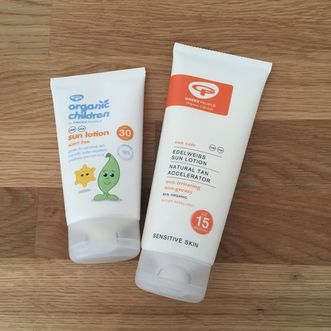 Looking for a sunscreen without the nasties? Look no further than The Green People. Their organic formula provides broad spectrum UVA and UVB protection without the use of sulphates and parabens. Their organic children cream (£18.50) contains a natural water repellent to keep kids safe in the pool. The Edelweiss sun lotion (£21) contains a natural tan accelerator to speed up tanning by 25% and reduce tan-fading by almost 50%. It also contains Aloe Vera, Green Tea, Marshmallow and Avocado to nourish skin and prevent peeling. 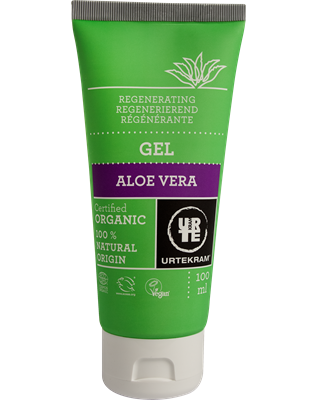 URTEKRAM® Aloe Vera Gel with hyaluronic acid and hexapeptide to help boost collagen and elastin formation is pure organic moisture and nourishment for dry skin, with soothing and healing properties for dehydrated or damaged skin cells. It is a fantastic after sun gel and excellent for sunburn as it helps promote the healing of sores and wounds. Just apply it directly on your skin and rub it gently. You can use it as often as you like and need. £6.35 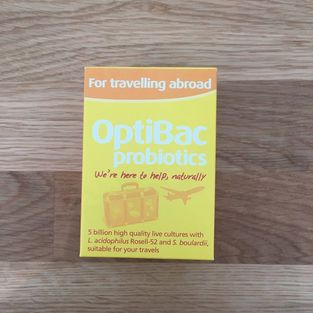 Heading somewhere exotic? Optibac for travelling abroad (£10.99 for 40) is a must have if you want to prevent tummy upsets while you're away. This supplement contains 4 high quality strains of live cultures, such as Lactobacillus acidophilus Rosell-52, all proven to survive to reach the gut alive, and to survive in warmer, more humid climates. Safe to take from 1 year onwards making this an ideal product for all the family including pregnant and nursing mums! 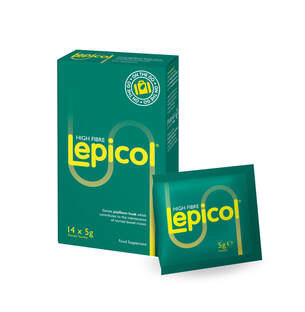 Constipation can also be a big problem for some people while travelling. Go prepared with these travel size lepicol sachets. Lepicol is a multi-fibre source product containing inulin and gentle psyllium husk, which contributes to maintaining normal bowel transit. The third key ingredient of Lepicol is 5 strains of live bacteria that are naturally present in a healthy person’s digestive system. Other top tips for avoiding constipation while away include: Staying hydrated - it's all too easy to get dehydrated while away, especially if you are having more alcohol than ususal. Don't over indulge - as tempting as it is to get your moneys worth at the all you can eat buffet, don't! You will pay for it later. Leave the chips, have the salad - Vegetables are full of fibre that our gut bugs love. Chips...not so much! Happy bugs, happy tummy, happy you. :) Avoid bread - in the same way that it soaks up soup in a bowl it absorbs liquid in your gut, drying out your stool and often leading to constipation. Move a little- much as we like to sit and watch the world go by on holiday or indulge in a good book, try and have a walk in the cooler parts of the day as this supports good bowel function too. 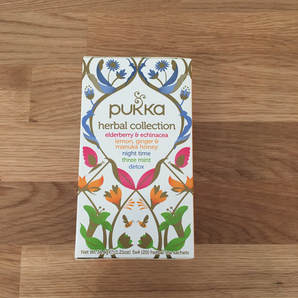 We're big fans of herbal teas and this gorgeous herbal collection (£2.79) is just the thing to pop in your suitcase. It contains: Night Time to help you wind down after a day's travelling. Elderberry & Echinacea to give your immune system a boost if your feeling croaky after a flight or constant air-con. Lemon, ginger and manuka honey can help reduce nausea if you suffer from travel sickness. Three Mint is just the thing to sip after indulging at the all you can eat buffet! Detox is a clean sweet tea perfect to pep you up after one too many holiday indulgences. Harriette recently took this collection on holiday with her and was so glad she did. "It was wonderful to have a few of my favourites with me instead of having to buy boxes of each when I got there. Just enough for my trip away and I didn't end up with 2 or 3 half used boxes in my case coming home." Fake tan anyone? If you're looking for a fake tan before you head away and frighten everyone with your whiter than white legs, you might like to try this award winning fake tan from Eco by Sonya. NO streaks with this one and NO chemicals either! Unsurprisingly it won the 2016 International Beauty awards and is a beautiful blend of aloe vera, rose geranium oil, avocado oil and chamomile. Harriette tried it recently to spruce up for a wedding and was delighted with the results. It's not something we'd normally entertain but this one is entirely natural and gets the job done very effectively. You can buy here on our website or pop into the shop to try out our testers. Real sunshine- Don't forget to have some full sun exposure without suncream in order to top up on that all important vitamin D. When you wear sun creams vitamin D is blocked so try and find what works for you in terms of minutes of exposure and time of day. Skin type will very much influence this so just have to be realistic about your own sensitivities and avoid burning. Sometimes early or late in the day can be an ideal time to get some vitamin D even if you only manage a few minutes. If you are particularly sensitive make sure to supplement as vitamin D is a much needed nutrient for many benefits including immune, mood and bone health and not something you want to be deficient in. Time for a good book! -If you'd like to get lost in a good book and fancy inspiring yourself with something super healthy on holiday, take a look at some of our favourites on all things health to get you in the mood for making some changes when you get home and even on holiday! Our final must haves are an eye mask and ear plugs. Sleep is so important and you never know if you will end up with noisy neighbours or thin curtains! If you fancy a holiday treat why not upgrade to a spacemask and let the warmth and light jasmine scent carry you away to another planet! If you would like more information about any of the products mentioned pop in and see us at 44 St Andrew Street, Aberdeen, AB25 1JA. Live further away? We are always happy to post things out just call Harriette on 01224 969637 and we can put together a box of goodies for you. Last week we covered Probiotics in Pregnancy and touched on how supplementing babies can help reduce the incidence of eczema and other allergies. But what about other common complaints in infancy? Can probiotics help there too? Let's look at some of the usual suspects: Colic is something that has troubled parents forever! The worst thing about colic is that we don't really know exactly what causes it. Having said that, anyone who has ever tried to comfort a colicy baby knows it's usually tummy trouble so trying a probiotic would make sense. A recent study now shows that introducing a probiotic has seen crying in infants fall by at least 50%. Another nightmare for new parents is reflux. (Not to be confused with 'happy pukers' it's totally normal for breastfed babies in particular to guzzle a little too much and then puke out the extra. It's part of their self regulation and why there is now a link between breastfeeding and reduced childhood obesity. If baby seems fine after they vomit you've probably got one of these!) Probiotics can be helpful here too. An Italian study has shown that probiotics can increase gastric emptying and therefore decrease the frequency of regurgitation. Constipation is also a common digestive problem in small children. Studies have shown that taking a probiotic can increase stool frequency and improve the consistency of stools. It has also been found to reduce the frequency of faecal incontinence and significantly reduce tummy pain. Severity and duration of boughts of diarrhoea have also been reduced by taking a probiotic. One finnish study found that the probiotics successfully colonized the gut and reduced the duration of watery diarrhoea usually associated with the rotavirus. In the ProChild study children were given either a placebo or Proven's Fit for School probiotic for six months. Children taking Fit for School had:
If you would like to know more or to discuss your probiotic needs with Beverley our registered Nutritional Therapist just pop into the shop: Nourishing Insights, 44 St Andrew Street, Aberdeen, AB25 1JA. References: A. Bird Schreck et al. (2016) Probiotics for the Treatment of Infantile Colic: A Systematic Review. Journal of Pharmacy Practice p1-9. F.Indrio et al. (2011) Lactobacillus reuteri accelerates gastric emptying and improves regurgitation in infants. European Journal of Clinical Investigation. 41(4) p 417-422. N. Bekkali et al. (2007) The role of a probiotics mixture in the treatment of childhood constipation: a pilot study. Nutrition Journal. 6(17) M. Tabbers et al. (2011) Is Bifidobacterium breve effective in the treatment of childhood constipation? Results from a pilot study. Nutrition Journal. 10(11) A.V. Shornikova et al (1997) Bacteriotherapy with Lactobacillus reuteri in rotavirus gastroenteritis. The Paediatric infectious disease Journal 16(12) p 1103-1107. I. Garaiova et al. (2015) Probiotics and vitamin C for the prevention of respiratory tract infections in children attending preschool: a randomised controlled pilot study. European Journal of Clinical Nutrition. 69 p.373-379. Last week we looked at the power of probiotics and the fact that we get our good bacteria from our mother when we are born. As the baby travels down the vaginal canal the baby is covered in secretions which contain their mother's flora. This is then swallowed by the baby and that bacteria colonizes their gut and forms the beginning of their immune system. This is why "seeding" (taking gauze soaked in this fluid and wiping it on the babies face) is becoming increasingly discussed as a way of getting that first colony into the baby after a C-section.
Think you don't need to take one? Let's look at some of the things that compromise gut flora. - Birth Control (Most women are on this prior to falling pregnant.) -Antibiotics (many women suffer with UTI's during pregnancy). -Antacids (how many women do you know who slept with rennies by the bed and spent the last trimester knocking back the gaviscon?) -Pesticides (Unless we eat an entirely organic diet, most of us are exposed to these through the diet). -Household Cleaning products (One word....Nesting!!) -The list goes on! Still not convinced? Well let's look at the benefits of taking probiotics for you and your baby both in vitro and beyond. A 2010 Scandinavian study showed that probiotics significantly reduced the risk of Gestational Diabetes and that coupled with proper nutritional support reduced the risk of foetal overgrowth associated with it. This of course has the knock on effect of reducing the need for medical intervention during delivery. A further study has shown that in addition to reducing hypertension (high blood pressure) and inflammation, intake of probiotics also significantly reduces the risk of pre-eclampsia and spontaneous preterm delivery. Those who took probiotics daily had the lowest risk factors when compared with those who consumed them only weekly or monthly. Taking probiotics prior to giving birth and then giving them to the infant for the following 6 months has been shown to reduce the incidence of eczema. The Swansea Baby Trial supported these results. Babies given Lab4b (the probiotic used in the Proven range) were 57% less likely to develop allergic eczema than those receiving the dummy product. It also showed that children whose mothers had probiotics in the last trimester along with taking them for the following 6 months were 44% less likely to develop allergic reaction to the common allergens including pollen, cow’s milk, egg, and house dust mite. The Swansea study also concluded that probiotics are safe and that taking them had no adverse effects to mum or baby. A Study from MIT has also showed that supplementation with probiotics increases the production of love hormone oxytocin. This in turn leads to increased immunity with the infant exhibiting robust skin and mucosae, rapid wound healing and resistance to infection. If you would like more information or to find out which probiotic is the right one for you pop in and see us. Nourishing Insights, 44 St Andrew Street, Aberdeen, AB25 1JA. References: https://www.umcg.nl/EN/corporate/News/Paginas/Antacid-use-dramatically-reduces-healthy-gut-microbial-flora.aspx http://lab4probiotics.co.uk/the-swansea-safety-in-newborns-study/index.html http://lab4probiotics.co.uk/the-swansea-baby-trial/index.html R.Luoto et al. (2010) Impact of maternal probiotic-supplemented dietary counselling on pregnancy outcome and prenatal and postnatal growth: a double-blind, placebo-controlled study. British Journal of Nutrition. 103 p. 1792-1799. A. Brantsaeter et al. (2011) Intake of Probiotic Food and Risk of Preeclampsia in Primiparous Women: The Norwegian Mother and Child Cohort Study. American Journal of Epidemiology. 174 (7) p.807-815 K. Kukkonen et al. (2007) Probiotics and prebiotic galacto-oligosaccharides in the prevention of allergic diseases: a randomized, double-blind, placebo-controlled trial. Journal of Allergy and Clinical Immunology. 119(1) 192-198. S.E. Erdman and T.Poutahidis. (2014) Probiotic ‘glow of health’: it’s more than skin deep. Beneficial Microbes. 5(2) p. 109-119. M.Murray &J.Pizzorno (2012) The Encyclopedia of Natural Medicine. Atria. New York. Probiotics seem to be something that everyone is talking about these days, but what exactly are they? What do they do? Where do they come from? How do I know if I need one?
'Probiotic' literally means 'for life'. More often are defined as being "viable microorganisms that have a beneficial effect in the prevention and treatment of specific pathologic conditions when they are ingested". Basically they are the good bacteria that should be found in your gut. Did you know that approximately 85% of your immune system is found in the gut? This is because it is the job of these good bacteria to be the gatekeepers to our body. They are our first defence against foreign bodies, preventing colonization by viral and bacterial pathogens. Wondering where you got your good bacteria from in the first place? Your mum! During a vaginal delivery the baby is covered in secretions which contain it's mothers bacteria. The mother passes her gut flora on to her baby and this in turn colonizes their gut. From that day forward we are constantly changing our gut flora depending on what we ingest. We are exposed to coughs, colds, travel, different foods, medications and all of these impact our gut ratio between good and bad bacteria. Sat there thinking well my granny hasn't taken a probiotic and she never gets ill at 96! The truth is that she has probably had her fair share of 'probiotics' but they just didn't call them that then. Traditionally fermented foods like sauerkraut, kefir, kombucha, raw yoghurt and even beer were all sources of good bacteria. In the days before fridges and supermarkets, fermentation was a way of preserving produce to survive long winters. These days everything goes in the fridge, crops are sprayed with pesticides which just like the antibiotics you get from the doctors are not selective about whether the bacteria they are killing is good or bad. Most supermarket products have also been pasteurised to extend shelf life and prevent outbreaks of harmful bacteria. This means that the good bacteria in traditionally fermented foods is killed along with any bad that may have been present. The good news is that there is now a move back towards traditional probiotics with kefir, kombucha, and sauerkraut gaining in popularity. Thinking about stocking up on those yoghurt drinks from the supermarket? Think again! Did you know that many of them have more sugar per 100g than fizzy pop? One of the easiest ways to up your good bacteria is to take a probiotic supplement many of which also contain prebiotics (food not absorbed by the host that supports the growth of good bacteria). So do you need a probiotic? The reality is that most of us should take a probiotic supplement even just in the short term. Why? The vast majority of us have at some point done at least one of the following all of which negatively effect your gut flora: taken an antibiotic; suffered from colds and viruses; have IBS or IBD; taken the contraceptive pill; taken steroids; travelled abroad; suffer from or have a family history of auto immune conditions e.g. under-active thyroid, diabetes, lupus, psoriasis, etc; or allergenic conditions e.g. food allergies and excema. There is a wealth of research out there which clearly demonstrates the huge role that probiotics have in supporting our immune system and preventing disease. A recent study examining the role of probiotics in the reduction of diabetes states that probiotics contribute to a reduction in inflammatory response and oxidative stress. This leads to increased insulin sensitivity and a reduction in the autoimmune response. Increasingly well known is the fact that our gut micro biome influences our mental health with neurotransmitters manufactured in the gut including serotonin and GABA. Allergenic diseases have increased over the last 40 years in industrialized nations but NOT in the developing world. Put simply we are just too clean, our homes and farms are sprayed to within an inch of their lives, we eat processed foods and we aren't exposed to the diseases we once were. All of this impacts on our gut flora and prevents the normal responses to allergens from developing properly leading to an increase in disease. Children with food allergies have been found to have an imbalance between good bacteria and potentially harmful ones. The same has been observed in a study of children with atopic eczema. So which one should I take? Well firstly you need to find a probiotic which is scientifically proven to survive gut acidity. Then the answer is it really depends on you and what your individual needs are. If you are looking to support mental health a probiotic with bacterial strains proven to support depression and anxiety would be a good start e.g. lactobacillus acidophilus Rosell-52 and bifidobacterium long rosell 175 found in Optibac for everyday. However, there are a variety of ranges designed specifically for different needs: travel abroad, when you're taking antibiotics, pregnancy, breastfed babies, bottlefed babies, managing cholesterol levels, one for women for targeting the intimate flora, the list goes on. Still not sure, or just want to know more? Pop into the shop and have a chat with us. References: R. Rolfe. (2000) The Role of Probiotic Cultures in the Control of Gastrointestinal Health. Journal of Nutrition. 130 p.3965-4025 M.Geuking et al. (2014) The interplay between the gut microbiota and the immune system. Gut Microbes 5(3) p. 411-418 P. Kirjavaninen et al. (2001) Characterizing the composition of intestinal microflora as a prospective treatment target in infant allergic disease. FEMS Immunology & Medical Microbiology. 32 (1) p. 1-7 B. Bjorksten et al. (1999) The intestinal microflora in allergic Estonian and Swedish 2-year-old children. Journal of the British Society for Allergy and Clinical Immunology. 29(3) p 342-346. A.Gomes et al. (2014) Gut microbiota, probiotics and diabetes. Nutrition Journal. 13(60) http://www.optibacprobiotics.co.uk/faq/why-consider-optibac-probiotics-over-probiotic-yoghurt-drinks  Do you spend summer a snivelling mess constantly searching for a hankie? Hay fever is a sure fire sign for many that summer is on it's way, that first tell tale sneeze in late spring as everything starts to bloom. Yup it's tissue time again. If like me you can't leave the house without a packet of tissues at this time of year our salvation may have been found....Probiotics! Researchers at Vanderbilt University School of Medicine have reviewed 23 studies analysing the most up to date data on the use of probiotics in the treatment of hay fever. They concluded that in the majority of studies patients symptoms improved significantly by using probiotic compared with those who don't. So there you have it, teeny tiny microorganisms are the answer we've been looking for! There are a number of different options available and we usually advise on particular strains of bacteria based on other health challenges. Other foods that can worsen symptoms are caffeine and alcohol and foods that contain histamine e.g., red wine, cheese, chocolate, and tomatoes. Wheat based foods can add to the inflammation for some and dairy products can increase mucus production as can sugar and excess starchy foods. Then there are those foods which are individual to you and these can be tested for via IgG Food Intolerance testing. Foods that support hayfever sufferers are those that reduce inflammation. Oily fish which increases our omega 3 fatty acids is anti-inflammatory. We can also supplement with this especially over the season. Incorporate ginger, rosemary and thyme into your cooking. Make ginger teas from fresh ginger and nettle. These foods will help counteract a runny nose and itchiness. Raw honey bought from local farms and bee keepers has been spoken about for a while and many have found taking a spoonful a day to be extremely helpful during pollen season. Supplementing vitamin C is helpful as it’s a natural anti-histamine. Most important is ensuring a rainbow diet with lots of flavonoids and a good range of nutrients. Another natural anti-histamine is quercetin found in foods such as red onion, peppers and citrus. This can be supplemented but if you are on medication, please contact a Nutritional therapist as it does have some drug nutrient interactions. Tumeric is another favourite of ours for hay fever support as research published in the journal Molecular Nutrition and food research 2008 demonstrated that turmeric prevented mast cells from releasing histamine. Oil of oregano has been shown in animal studies to prevent histamine release due to its component rosemarinic acid. Two of our favourite products for hay fever prevention combine the above to take best advantage of the latest science. These are quercetin plus and Epigenar Curcumin oregano quercetin complex. Whichever you go for, we hope that you will soon be able to leave your hankies at home! |
Amazon Associates DisclosureNourishing Insights is a participant in the Amazon EU Associates Programme, an affiliate advertising programme designed to provide a means for sites to earn advertising fees by advertising and linking to Amazon.co.uk. Archives
December 2023
|
WHAT OUR CLIENTS ARE SAYING“I did Nutritional Therapy with Beverley and it was life changing. I highly recommend it!” Allison Blakely (Glasgow)
|
Contact Us |




